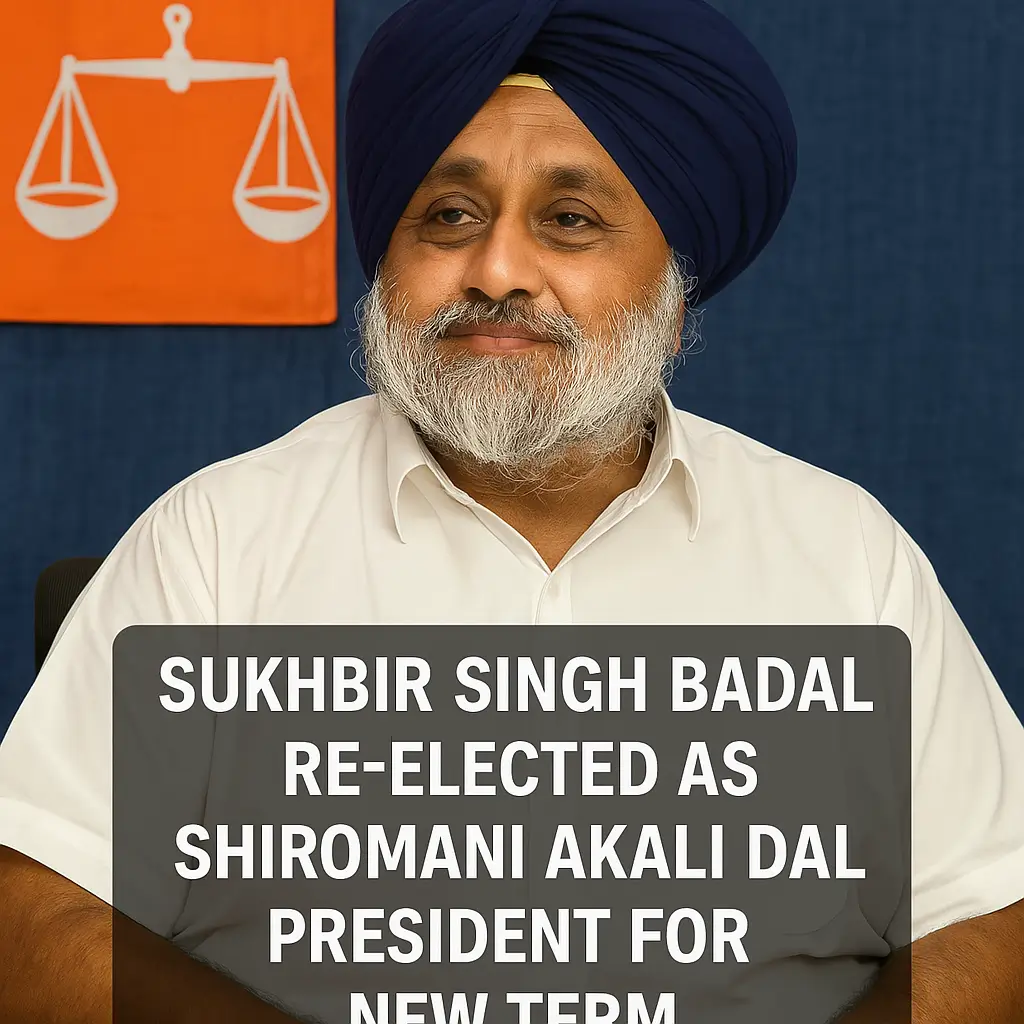In a significant political development, Sukhbir Singh Badal has been re-elected as the President of the Shiromani Akali Dal (SAD), one of Punjab’s oldest and most influential regional parties. The re-election, which took place during the party’s core committee meeting in April 2025, reaffirms Sukhbir’s long-standing leadership role and the continued trust of SAD cadres in his political vision.
This announcement holds substantial weight in Punjab’s political landscape, especially as the state gears up for the next round of Lok Sabha and assembly elections. The decision marks Sukhbir Singh Badal’s fifth consecutive term as SAD President, showcasing his tight grip on the party and his central role in shaping its future strategy.
Who Is Sukhbir Singh Badal?
Sukhbir Singh Badal, son of veteran leader and former Punjab Chief Minister Parkash Singh Badal, has been at the forefront of SAD’s leadership for over a decade. With a strong political background and multiple ministerial stints at both the state and central level, Sukhbir has carried forward the Akali Dal legacy while adapting to changing political realities.
He has previously served as:
- Deputy Chief Minister of Punjab (2009–2017)
- Member of Parliament (Lok Sabha) from Firozpur
- A key coalition partner in the NDA (National Democratic Alliance) before SAD parted ways in 2020 over farm law protests
How Was the Re-Election Conducted?
The re-election took place through an internal democratic process during a high-level meeting of the Shiromani Akali Dal’s core and working committee. Senior leaders, district presidents, and office bearers unanimously backed Sukhbir Singh Badal’s name, citing his experience, grassroots connect, and ability to steer the party through turbulent political times.
This move comes as no surprise, given that Sukhbir has remained unchallenged in party elections since he officially took over the presidency from his father in 2008.
SAD’s Political Standing & Recent Challenges
The Shiromani Akali Dal has historically been a dominant force in Punjab politics, especially with its deep-rooted connections to Sikh religious institutions like the Shiromani Gurdwara Parbandhak Committee (SGPC). However, in recent years, the party has faced multiple setbacks:
- Breakup with the BJP in 2020 over the contentious farm laws, which led to SAD walking out of the NDA.
- Electoral defeats, especially in the 2022 Punjab Assembly Elections, where the party performed poorly amid rising popularity of the Aam Aadmi Party (AAP).
- Allegations of corruption, drug trade nexus, and mishandling of sacrilege incidents, all of which have dented the party’s image.
Despite these hurdles, Sukhbir’s leadership has been credited with keeping the party united and relevant in Punjab’s dynamic political ecosystem.
Why Was Sukhbir Re-Elected?
Several factors contributed to Sukhbir Singh Badal’s re-election:
1. Consistency in Leadership
In times of political instability, SAD leaders and workers believe that consistent leadership is crucial. Sukhbir’s tenure has seen the party withstand major political storms, including its split from the BJP and declining electoral performance.
2. Grassroots Network
Sukhbir continues to maintain strong relationships with district-level party workers, religious leaders, and rural voters, especially in the Malwa region of Punjab.
3. Organizational Control
He holds sway over the party’s decision-making bodies, including the youth wing, women’s wing, and SGPC-affiliated leaders. His organizational skills and control make him the de facto choice.
4. 2024 Lok Sabha Elections Performance
While SAD didn’t win many seats in the 2024 general elections, it did improve its vote share in certain pockets, especially in rural constituencies. Sukhbir’s campaign strategies and public outreach were acknowledged as contributing factors.
Future Roadmap for SAD Under Sukhbir Singh Badal
Sukhbir’s re-election comes at a crucial juncture. With the 2027 Punjab Assembly elections approaching, he now faces the mammoth task of reviving the party’s base and rebuilding public trust. His agenda is likely to focus on:
- Strengthening ties with Sikh institutions to regain religious and cultural legitimacy
- Relaunching grassroots campaigns in rural and semi-urban areas
- Rebranding SAD’s image among youth and first-time voters
- Addressing key issues like unemployment, drug addiction, sacrilege justice, and farmer welfare
- Possibly forging new political alliances to boost electoral prospects
Reactions from Political Leaders and Public
Internal Party Leaders
Many SAD leaders hailed the re-election as a step in the right direction. Senior Akali leader Balwinder Singh Bhundur said, “Sukhbir ji has shown strength, patience, and vision in difficult times. His re-election is necessary for the party’s unity and revival.”
Opposition Response
Leaders from AAP and Congress criticized the move, calling it a “dynastic rubber stamp” and accusing SAD of failing to reform. However, political analysts argue that without a strong internal challenger, Sukhbir remains SAD’s only viable option.
Public Sentiment
While some sections of the rural population and traditional SAD supporters still stand by Sukhbir, the party has significant ground to cover among urban voters and youth, who are increasingly leaning towards newer political alternatives.
Legacy of the Badal Family in SAD
The Badal family has been synonymous with SAD for decades. Late Parkash Singh Badal, Sukhbir’s father, served as Punjab’s Chief Minister five times and was regarded as a statesman even by rivals. Sukhbir inherited not just the presidency but also the political legacy, both of which come with high expectations and scrutiny.
Despite criticism of nepotism, many within SAD see Sukhbir as the natural successor to his father’s legacy.
Conclusion
The re-election of Sukhbir Singh Badal as the Shiromani Akali Dal President marks both continuity and challenge. While he continues to enjoy internal support, the real test lies ahead—reviving a party that has struggled electorally and reputationally in recent years.
With renewed leadership and sharpened focus, SAD under Sukhbir Singh Badal must now navigate the complex political landscape of Punjab, reconnect with its grassroots, and rebuild trust among a more skeptical, politically aware electorate.
Only time will tell whether Sukhbir’s next term will mark a resurgence or further decline of one of Punjab’s most iconic political parties.

